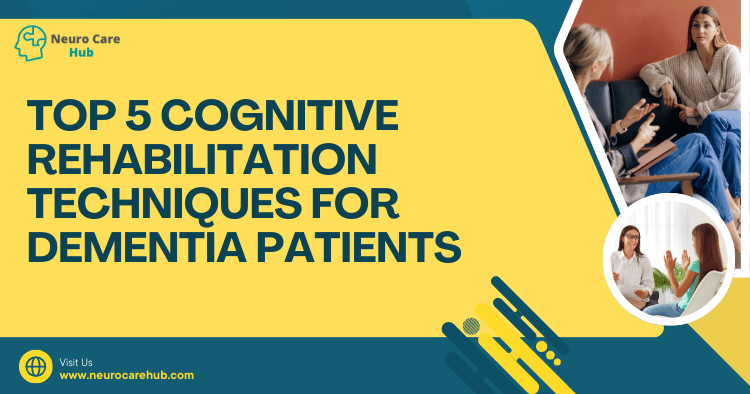Table of Contents
- 1. Introduction
- 2. Cognitive Stimulation Therapy (CST)
- 3. Reality Orientation Therapy (ROT)
- 4. Reminiscence Therapy
- 5. Cognitive Training Exercises
- 6. Music Therapy
- 7. Conclusion
- 8. FAQs
1. Introduction
Dementia affects millions of individuals worldwide, impacting their memory, thinking, and daily functioning. While there’s no cure for dementia, cognitive rehabilitation techniques can significantly improve the quality of life for patients and their caregivers. This article explores the top five cognitive rehabilitation techniques for dementia patients, providing insights into how each method works, its benefits, and tips for implementation.
2. Cognitive Stimulation Therapy (CST)
Cognitive Stimulation Therapy (CST) is a structured program designed to engage patients in various activities that stimulate thinking and memory.
How It Works
CST typically involves group sessions where patients participate in discussions, games, and exercises aimed at enhancing cognitive functions. The activities are often tailored to the interests and abilities of the participants, making them enjoyable and engaging.
“CST is like a workout for the brain—keeping it active and engaged can lead to remarkable improvements!”
Benefits
- Improves Memory: Regular participation can lead to enhancements in memory recall.
- Promotes Social Interaction: Group settings foster social connections, reducing feelings of isolation.
- Enhances Quality of Life: Engaging activities help maintain cognitive function, leading to a more fulfilling life.
Tips for Implementation
- Look for local support groups or community centers offering CST.
- Incorporate familiar topics or interests to make sessions more relatable.
For more in-depth information on CST, visit Alzheimer’s Society.
3. Reality Orientation Therapy (ROT)
Reality Orientation Therapy (ROT) helps dementia patients reconnect with their environment by providing consistent and factual information about time, place, and identity.
How It Works
ROT involves regular reminders about the current date, time, and location, often through visual aids like calendars, clocks, and photographs. Caregivers can also engage patients in conversations about their lives, helping them recall important memories.
“Think of ROT as a lighthouse guiding patients through the fog of confusion.”
Benefits
- Reduces Confusion: Frequent orientation promotes a sense of stability and familiarity.
- Boosts Self-Awareness: Patients become more aware of their surroundings and situation, which can reduce anxiety.
Tips for Implementation
- Use large, clear visual aids that are easy to read.
- Encourage family members to participate in discussions about the patient’s past.
Also Look For
For expert insights on ROT, check out resources from the National Institute on Aging.
4. Reminiscence Therapy
Reminiscence Therapy focuses on encouraging patients to share and reflect on their past experiences and memories, often through the use of photographs, music, and familiar objects.
How It Works
Patients are prompted to discuss their life stories, including significant events, people, and places. This method not only stimulates cognitive function but also strengthens emotional connections.
“Reminiscence Therapy is like opening a treasure chest of memories, allowing patients to relive the moments that shaped their lives.”
Benefits
- Enhances Memory Retrieval: Discussing past experiences helps strengthen neural pathways.
- Improves Mood: Engaging with positive memories can uplift a patient’s spirit and reduce feelings of depression.
Tips for Implementation
- Create memory boxes filled with personal items or photographs that spark conversation.
- Use music from the patient’s younger years to evoke memories.
For More Information
For more guidance on reminiscence therapy, visit The Alzheimer’s Association.
5. Cognitive Training Exercises
Cognitive training exercises are structured activities specifically designed to enhance cognitive skills such as attention, memory, and problem-solving.
How It Works
These exercises can include puzzles, memory games, and brain teasers that challenge patients in a supportive environment. Many exercises can be found in apps and online platforms, making them accessible for daily practice.
“Cognitive training is like lifting weights for the mind—each exercise strengthens a different cognitive muscle.”
Benefits
- Strengthens Cognitive Skills: Regular engagement can lead to improvements in various cognitive domains.
- Customizable: Exercises can be tailored to the patient’s current cognitive level.
Tips for Implementation
- Use apps designed for cognitive training, such as Lumosity or BrainHQ, which offer a variety of exercises.
- Set aside dedicated time each day for cognitive training to establish a routine.
6. Music Therapy
Music therapy leverages the therapeutic effects of music to improve cognitive function, mood, and overall well-being in dementia patients.
How It Works
Therapists use music to stimulate memories, encourage expression, and enhance communication. Activities may include singing, listening to familiar songs, or even creating music.
“Music has a unique way of reaching the parts of the brain that other stimuli cannot—it’s a universal language.”
Benefits
- Stimulates Memory: Music can evoke memories and emotions, providing a powerful connection to the past.
- Reduces Anxiety: Calming music can help reduce agitation and promote a sense of peace.
Tips for Implementation
- Create personalized playlists of songs that are meaningful to the patient.
- Encourage participation in group singing or music-related activities.
Explore More
For more information on the benefits of music therapy, check out Music & Memory.
7. Conclusion
Cognitive rehabilitation techniques play a crucial role in enhancing the lives of dementia patients. By incorporating methods like CST, ROT, reminiscence therapy, cognitive exercises, and music therapy, caregivers can provide meaningful support that fosters cognitive health and emotional well-being. Always consult with healthcare professionals to tailor these techniques to individual needs.
8. FAQs
Q: Can cognitive rehabilitation cure dementia?
A: No, cognitive rehabilitation cannot cure dementia, but it can improve cognitive function and quality of life.
Q: How often should these techniques be practiced?
A: Regular practice is essential—daily or several times a week is recommended for optimal benefits.
Q: Are these techniques suitable for all stages of dementia?
A: Many techniques can be adapted for different stages of dementia, but it’s essential to tailor activities to the individual’s cognitive abilities.
By keeping a friendly tone and providing a comprehensive understanding of each rehabilitation technique, this article aims to empower caregivers and family members in their journey with dementia patients. For more insights on neuro care and its importance in modern medicine, check out Top 5 Reasons Neuro Care is Essential in Modern Medicine.





